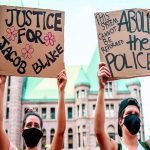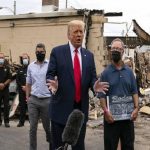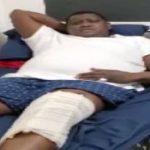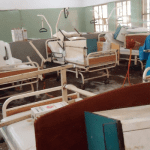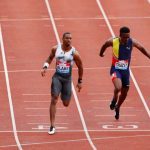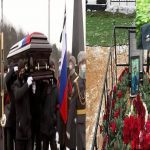Jacob Blake, the Black man who was shot in the back by a white police officer in Wisconsin last month, spoke out for the first time from his hospital bed as dueling demonstrations over racial justice and policing continued to roil a handful of U.S. cities.
In a video posted on Twitter, Mr. Blake, dressed in a green hospital gown, described being in constant pain after the shooting that left him paralyzed from the waist down.
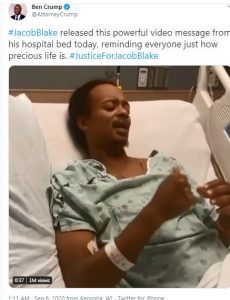
The Aug. 23 shooting of Blake, 29, reignited protests over racism and police brutality that swept the United States after another Black man, George Floyd, died in May when a Minneapolis police officer knelt on his neck for nearly nine minutes.
The demonstrations have coincided with widespread upheaval over the social and economic consequences of the coronavirus pandemic, which has killed nearly 190,000 people in the United States, the highest death toll in the world.
The protests have also moved to the forefront of the presidential election campaign, with President Donald Trump now focused on a platform of law and order in his effort to be re-elected on Nov. 3.
Jacob Blake, the Black man who was shot in the back by a white police officer in Wisconsin last month, spoke out for the first time from his hospital bed as dueling demonstrations over racial justice and policing continued to roil a handful of U.S. cities.
In a video posted on Twitter, Mr. Blake, dressed in a green hospital gown, described being in constant pain after the shooting that left him paralyzed from the waist down.

The Aug. 23 shooting of Blake, 29, reignited protests over racism and police brutality that swept the United States after another Black man, George Floyd, died in May when a Minneapolis police officer knelt on his neck for nearly nine minutes.
The demonstrations have coincided with widespread upheaval over the social and economic consequences of the coronavirus pandemic, which has killed nearly 190,000 people in the United States, the highest death toll in the world.
The protests have also moved to the forefront of the presidential election campaign, with President Donald Trump now focused on a platform of law and order in his effort to be re-elected on Nov. 3.
Jacob Blake, the Black man who was shot in the back by a white police officer in Wisconsin last month, spoke out for the first time from his hospital bed as dueling demonstrations over racial justice and policing continued to roil a handful of U.S. cities.
In a video posted on Twitter, Mr. Blake, dressed in a green hospital gown, described being in constant pain after the shooting that left him paralyzed from the waist down.

The Aug. 23 shooting of Blake, 29, reignited protests over racism and police brutality that swept the United States after another Black man, George Floyd, died in May when a Minneapolis police officer knelt on his neck for nearly nine minutes.
The demonstrations have coincided with widespread upheaval over the social and economic consequences of the coronavirus pandemic, which has killed nearly 190,000 people in the United States, the highest death toll in the world.
The protests have also moved to the forefront of the presidential election campaign, with President Donald Trump now focused on a platform of law and order in his effort to be re-elected on Nov. 3.
Jacob Blake, the Black man who was shot in the back by a white police officer in Wisconsin last month, spoke out for the first time from his hospital bed as dueling demonstrations over racial justice and policing continued to roil a handful of U.S. cities.
In a video posted on Twitter, Mr. Blake, dressed in a green hospital gown, described being in constant pain after the shooting that left him paralyzed from the waist down.

The Aug. 23 shooting of Blake, 29, reignited protests over racism and police brutality that swept the United States after another Black man, George Floyd, died in May when a Minneapolis police officer knelt on his neck for nearly nine minutes.
The demonstrations have coincided with widespread upheaval over the social and economic consequences of the coronavirus pandemic, which has killed nearly 190,000 people in the United States, the highest death toll in the world.
The protests have also moved to the forefront of the presidential election campaign, with President Donald Trump now focused on a platform of law and order in his effort to be re-elected on Nov. 3.
Jacob Blake, the Black man who was shot in the back by a white police officer in Wisconsin last month, spoke out for the first time from his hospital bed as dueling demonstrations over racial justice and policing continued to roil a handful of U.S. cities.
In a video posted on Twitter, Mr. Blake, dressed in a green hospital gown, described being in constant pain after the shooting that left him paralyzed from the waist down.

The Aug. 23 shooting of Blake, 29, reignited protests over racism and police brutality that swept the United States after another Black man, George Floyd, died in May when a Minneapolis police officer knelt on his neck for nearly nine minutes.
The demonstrations have coincided with widespread upheaval over the social and economic consequences of the coronavirus pandemic, which has killed nearly 190,000 people in the United States, the highest death toll in the world.
The protests have also moved to the forefront of the presidential election campaign, with President Donald Trump now focused on a platform of law and order in his effort to be re-elected on Nov. 3.
Jacob Blake, the Black man who was shot in the back by a white police officer in Wisconsin last month, spoke out for the first time from his hospital bed as dueling demonstrations over racial justice and policing continued to roil a handful of U.S. cities.
In a video posted on Twitter, Mr. Blake, dressed in a green hospital gown, described being in constant pain after the shooting that left him paralyzed from the waist down.

The Aug. 23 shooting of Blake, 29, reignited protests over racism and police brutality that swept the United States after another Black man, George Floyd, died in May when a Minneapolis police officer knelt on his neck for nearly nine minutes.
The demonstrations have coincided with widespread upheaval over the social and economic consequences of the coronavirus pandemic, which has killed nearly 190,000 people in the United States, the highest death toll in the world.
The protests have also moved to the forefront of the presidential election campaign, with President Donald Trump now focused on a platform of law and order in his effort to be re-elected on Nov. 3.
Jacob Blake, the Black man who was shot in the back by a white police officer in Wisconsin last month, spoke out for the first time from his hospital bed as dueling demonstrations over racial justice and policing continued to roil a handful of U.S. cities.
In a video posted on Twitter, Mr. Blake, dressed in a green hospital gown, described being in constant pain after the shooting that left him paralyzed from the waist down.

The Aug. 23 shooting of Blake, 29, reignited protests over racism and police brutality that swept the United States after another Black man, George Floyd, died in May when a Minneapolis police officer knelt on his neck for nearly nine minutes.
The demonstrations have coincided with widespread upheaval over the social and economic consequences of the coronavirus pandemic, which has killed nearly 190,000 people in the United States, the highest death toll in the world.
The protests have also moved to the forefront of the presidential election campaign, with President Donald Trump now focused on a platform of law and order in his effort to be re-elected on Nov. 3.
Jacob Blake, the Black man who was shot in the back by a white police officer in Wisconsin last month, spoke out for the first time from his hospital bed as dueling demonstrations over racial justice and policing continued to roil a handful of U.S. cities.
In a video posted on Twitter, Mr. Blake, dressed in a green hospital gown, described being in constant pain after the shooting that left him paralyzed from the waist down.

The Aug. 23 shooting of Blake, 29, reignited protests over racism and police brutality that swept the United States after another Black man, George Floyd, died in May when a Minneapolis police officer knelt on his neck for nearly nine minutes.
The demonstrations have coincided with widespread upheaval over the social and economic consequences of the coronavirus pandemic, which has killed nearly 190,000 people in the United States, the highest death toll in the world.
The protests have also moved to the forefront of the presidential election campaign, with President Donald Trump now focused on a platform of law and order in his effort to be re-elected on Nov. 3.


